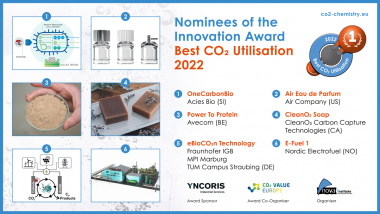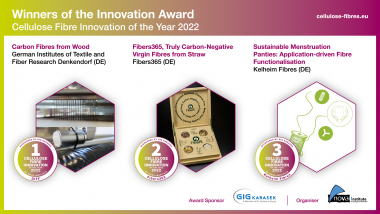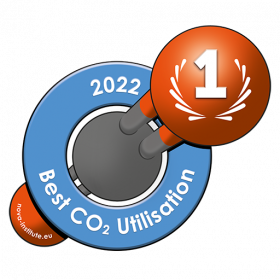Winner of Cellulose Fibre Innovation Award 2024
The “Cellulose Fibres Conference 2024” held in Cologne on 13-14 March demonstrated the innovative power of the cellulose fibre industry. Several projects and scale-ups for textiles, hygiene products, construction and packaging showed the growth and bright future of this industry, supported by the policy framework to reduce single-use plastic products, such as the Single Use Plastics Directive (SUPD) in Europe.
40 international speakers presented the latest market trends in their industry and illustrated the innovation potential of cellulose fibres. Leading experts introduced new technologies for the recycling of cellulose-rich raw materials and gave insights into circular economy practices in the fields of textiles, hygiene, construction and packaging. All presentations were followed by exciting panel discussions with active audience participation including numerous questions and comments from the audience in Cologne and online. Once again, the Cellulose Fibres Conference proved to be an excellent networking opportunity to the 214 participants and 23 exhibitors from 27 countries. The annual conference is a unique meeting point for the global cellulose fibre industry.
For the fourth time, nova-Institute has awarded the “Cellulose Fibre Innovation of the Year” Award at the Cellulose Fibres Conference. The Innovation Award recognises applications and innovations that will lead the way in the industry’s transition to sustainable fibres. Close race between the nominees – “The Straw Flexi-Dress” by DITF & VRETENA (Germany), cellulose textile fibre from unbleached straw pulp, is the winning cellulose fibre innovation 2024, followed by HONEXT (Spain) with the “HONEXT® Board FR-B (B-s1, d0)” from fibre waste from the paper industry, while TreeToTextile (Sweden) with their “New Generation of Bio-based and Resource-efficient Fibre” won third place.
Prior to the event, the conference advisory board had nominated six remarkable innovations for the award. The nominees were neck and neck, when the winners were elected in a live vote by the audience on the first day of the conference.
First place
DITF & VRETENA (Germany): The Straw Flexi-Dress – Design Meets Sustainability
The Flexi-Dress design was inspired by the natural golden colour and silky touch of HighPerCell® (HPC) filaments based on unbleached straw pulp. These cellulose filaments are produced using environmentally friendly spinning technology in a closed-loop production process. The design decisions focused on the emotional connection and attachment to the HPC material to create a local and circular fashion product. The Flexi-Dress is designed as a versatile knitted garment – from work to street – that can be worn as a dress, but can also be split into two pieces – used separately as a top and a straight skirt. The top can also be worn with the V-neck front or back. The HPC textile knit structure was considered important for comfort and emotional properties.
Second place
Honext Material (Spain): HONEXT® Board FR-B (B-s1, d0) – Flame-retardant Board made From Upcycled Fibre Waste From the Paper Industry
HONEXT® FR-B board (B-s1, d0) is a flame-retardant board made from 100 % upcycled industrial waste fibres from the paper industry. Thanks to innovations in biotechnology, paper sludge is upcycled – the previously “worthless” residue from paper making – to create a fully recyclable material, all without the use of resins. This lightweight and easy-to-handle board boasts high mechanical performance and stability, along with low thermal conductivity, making it perfect for various applications in all interior environments where fire safety is a priority. The material is non-toxic, with no added VOCs, ensuring safety for both people and the planet. A sustainable and healthy material for the built environment, it achieves Cradle-to-Cradle Certified GOLD, and Material Health CertificateTM Gold Level version 4.0 with a carbon-negative footprint. Additionally, the product is verified in the Product Environmental Footprint.
Third Place
TreeToTextile (Sweden): A New Generation of Bio-based and Resource-efficient Fibre
TreeToTextile has developed a unique, sustainable and resource efficient fibre that doesn’t exist on the market today. It has a natural dry feel similar to cotton and a semi-dull sheen and high drape like viscose. It is based on cellulose and has the potential to complement or replace cotton, viscose and polyester as a single fibre or in blends, depending on the application.
TreeToTextile Technology™ has a low demand for chemicals, energy and water. According to a third party verified LCA, the TreeToTextile fibre has a climate impact of 0.6 kg CO2 eq/kilo fibre. The fibre is made from bio-based and traceable resources and is biodegradable.
The next conference will be held on 12-13 March 2025.
Cellulose Fibre Innovation of the Year cellulose fiber Cellulose Fibres Conference DITF VRETENA Honext TreeToTextile
nova-Institut für politische und ökologische Innovation GmbH













